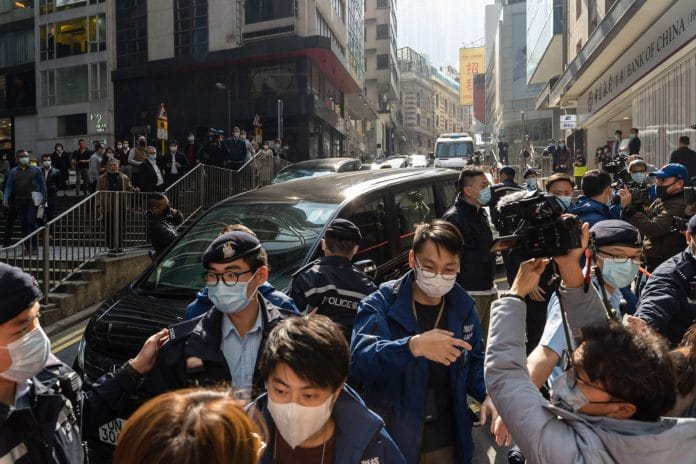The arrests of more than 50 pro-democracy politicians in Hong Kong mark Beijing’s most sweeping attempt yet to redefine the “One Country, Two Systems” arrangement that governed the former British colony’s return to China 23 years ago. They are a challenge to both the incoming U.S. administration of President-elect Joe Biden and the European Union, which concluded an ill-timed investment deal with China only last week.
The opposition figures, along with an American lawyer, were detained for organizing and participating in an informal primary election in July, which Chinese agencies and the city’s leader condemned at the time as an “unlawful manipulation” of the city’s election system and a potential violation of the national security law that took effect the same month.
Let’s be clear. The primary that authorities have labeled subversion is simply democratic politics as it has been conducted in Hong Kong for more than a decade. The purpose of the exercise, in which more than 600,000 Hong Kong people voted, was to select the candidates with the best chances of prevailing in last year’s planned September elections for the city’s Legislative Council. The opposition camp’s real crime is to have come too close to winning.
Even with a system designed to preserve Beijing’s control, the alignment of political groups known as the pan-democrats stood a genuine chance of gaining a majority in the September poll. That would have enabled them to vote down the government’s budget and force Chief Executive Carrie Lam’s resignation. Lam subsequently postponed the election for a year, citing Covid.
Wednesday’s arrests run counter to the chief executive’s assurances that the national security law would target only an “extremely small minority” of people. In the last free vote to be held in Hong Kong, the lower-tier district council elections of November 2019, pro-democracy forces scored an overwhelming victory. On that basis, the politicians rounded up on Wednesday would seem to represent a majority of the city.
Hong Kong’s authorities insist they are acting to prevent chaos. Opposition figures wanted to plunge the city into an “abyss” and create “mutual destruction,” Secretary for Security John Lee told a briefing. While the process to force the chief executive’s resignation is set out in the Basic Law, Hong Kong’s de facto constitution, the national security law forbids “seriously interfering in, disrupting, or undermining the performance of duties and functions” of the government.
Irrespective of this apparent contradiction, the root of Hong Kong’s political dysfunction lies in the government’s lack of democratic legitimacy. The opposition activists could not threaten such action if they did not have popular support; indeed, their program aimed to increase pressure for a more democratic system, as promised in the Basic Law.
Arresting pro-democracy politicians does nothing to address this deficit. On the contrary, it erases all opposition, effectively turning Hong Kong’s legislature into a rubber stamp akin to China’s National People’s Congress. This zero-tolerance approach is part of a wider program to align the city more closely with mainland Chinese norms that has seen pressure put on teachers, the courts and the media.
The timing of these arrests, as the U.S. grapples with a messy political transition at home, is a signal that Beijing will remain impervious to international pressure (having scorned the Trump administration’s sanctions on individuals deemed to have played a role in eroding Hong Kong’s autonomy). The arrest of American lawyer John Clancey may be seen as an additional gesture of defiance. Antony Blinken, Biden’s pick for Secretary of State, was quick to react, writing on Twitter that the arrests were “an assault on those bravely advocating for universal rights.” Meanwhile, the EU’s insistence that its investment deal with China will enable the bloc to influence China’s behavior looks shaky already.
While the political imperative of bringing Hong Kong to heel clearly outweighs the market and economic consequences for Beijing, it appears unlikely there will be any immediate price to pay in these terms. The city’s benchmark Hang Seng Index finished little changed on the day. With the U.S. dollar weakening steadily since the enactment of the national security law and China’s economy and markets recovering, there is pressure — other things equal — for Hong Kong assets to rise.
The longer-term consequences for Hong Kong’s viability as an international financial center are another question. The money won’t stop flowing through anytime soon. But global financial executives are a wealthy, and mobile, bunch. How many will want to stay in a city where authorities are straining so hard to hold down a sullen and resentful local population, when they could be in New York or London — or even Singapore?
Absent a political settlement that resolves some of Hong Kong’s deep-seated conflicts, a slow erosion of the city’s status looks the most likely path forward.-Bloomberg
Also read: Hong Kong arrests dozens of democracy activists, politicians under national security law






